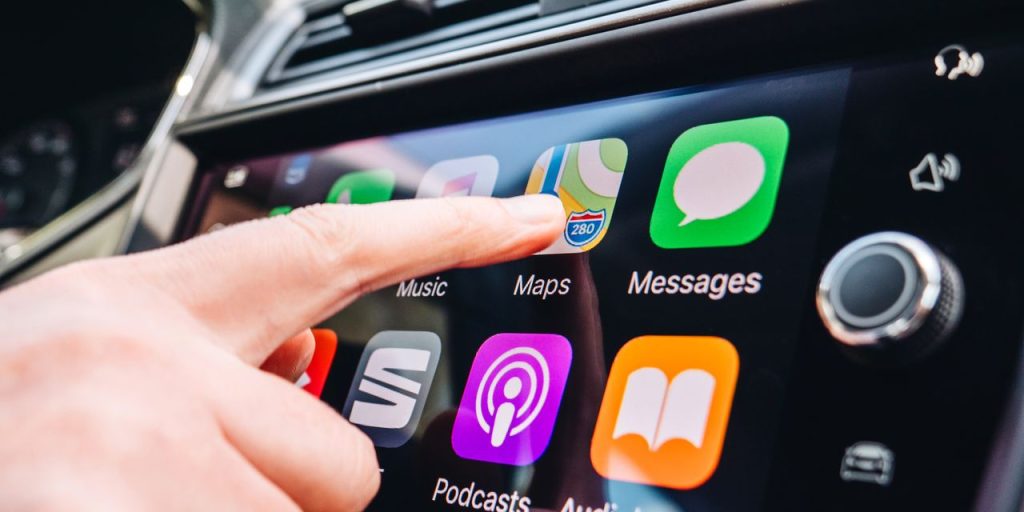Reports about Apple getting into the car business are pervasive. Most focus on Apple designing an electric vehicle of some kind. If the tech behemoth is really serious about competing for a slice of the auto industry’s $3 trillion in sales, however, there is a far better way to do it.
Apple
(ticker: AAPL) should start with a modest purchase of an automotive supplier that does all the things the iPhone maker already understands. It should acquire
Visteon
(VC). It could be an easy buy. Apple had $165 billion in cash as of Dec. 31, while Visteon has a market value of $4.2 billion.
Visteon declined to comment. Apple didn’t respond to a request for comment about Barron’s idea.
The Apple Car is the great white whale of the auto and tech industry. The Apple Car project even has its own Wikipedia page and every time a former Apple exec gets hired at an auto company, such as Doug Field at
Ford Motor
(F), it’s headline-making news. But investors are almost a decade into their Apple Car fascination, and the only actual product the company released in that time is Apple CarPlay, a mere app that the company supplies to auto makers.
“The auto maker is needed to essentially make CarPlay work in the car,” says Baird analyst Luke Junk. Auto makers “have software that plays with CarPlay, they have all the hardware back end.”
And auto makers aren’t all that enamored with CarPlay, anymore.
General Motors
(GM) recently announced some new vehicles in 2024 won’t support CarPlay or
Alphabet’s
(GOOGL) Android Auto.
Apps such as Google Maps will still be available, but GM is taking a page out of
Tesla’s
(TSLA) playbook which loads apps onto Tesla’s iPad-like screen using its own native software, without any phone projection. That strategy gives Tesla the ability to route people to EV charging when navigating long trips—charge about $10 a month for premium connectivity.
It feels as if Apple shouldn’t have this much trouble in the car business. It is the world’s most valuable company, and generates roughly $100 billion in free cash flow a year—as much free cash flow as all global auto makers combined.
Still, Apple is on the outside looking in: It just doesn’t have the hardware. The heart of the Apple ecosystem is the iPhone. Apple controls the hardware and the chip design, and Apple is the gatekeeper for the apps that work on the iPhone. Their customers, phone users, expect and pay up for constant improvements. In the automotive ecosystem, the car is, essentially, the iPhone.
That’s why, if Apple wants a significant car business, it needs to reframe its automotive question. Apple should think of auto makers as its end customer. In the car-company-as-my-customer paradigm, the Apple iPhone equivalent is the infotainment system. Apple can sell that to auto makers.
There is opportunity in infotainment systems, which are getting smarter and functions like the radio, navigation, and driving information merging into one display with more data processed by fewer microchips.
One of the dominant producers of infotainment technology is Van Buren Township, Mich.-based Visteon, a small-capitalization automotive supplier that makes instrument clusters, telematics, and displays, among other things.
“Visteon is at the front of the line with their [solution], weaving all those things together in the cockpit.” says Junk. “The chip itself, the software that goes along with that…it’s a very comprehensive solution.”
Sales in 2023 are expected to come in at about $4.1 billion. And shares trade for about 20.7 times estimated 2023 earnings. That’s a bigger multiple than most auto suppliers get, but Visteon has more growth. Sales and earnings are expected to grow about 9% and 28%, respectively, through 2025 from 2023.
Sales are tiny relative to Apple’s $300-plus billion in product-related sales expected for 2023, but owning Visteon’s software and hardware would be an excellent, and achievable, way into the automotive business.
The idea isn’t without precedent.
Samsung
bought Visteon competitor Harman in 2016 for $8 billion, or about 1.1 times sales.
“Harman perfectly complements Samsung in terms of technologies, products and solutions,” said Samsung CEO Oh-Hyun Kwon in a news release at the time of the acquisition. “As a Tier 1 automotive supplier with deep customer relationships, strong brands, leading technology and a recognized portfolio of best-in-class products, Harman immediately establishes a strong foundation for Samsung to grow our automotive platform.”
It’s happened before, so It could happen again. Even if Apple doesn’t acquire Visteon, cars are going to keep getting smarter, processing and displaying more data, which will benefit Visteon and its investors.
Junk rates Visteon stock at Overweight with a price target of $172, about 17% above recent levels. That’s not a bad return and, who knows, investors could find Visteon taken out by a larger fish in the ocean some day.
Visteon shares are up about 12% year to date while the
S&P 500
and
Dow Jones Industrial Average
have added and about 8% and 2%, respectively.
Write to Al Root at allen.root@dowjones.com
Read the full article here




